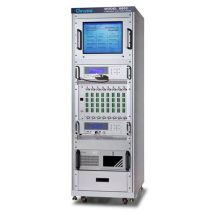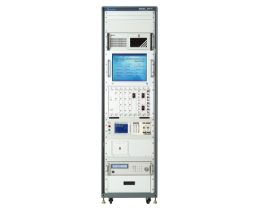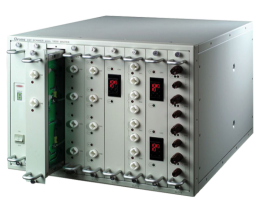ATS - Automated Test Systems /
Component Test Systems
Component test systems are specialized tools used to test the functionality and performance of individual electronic components. These systems are widely used in the electronics industry, where they play a critical role in ensuring the quality and reliability of electronic devices.
The main function of a component test system is to measure the electrical properties of electronic components such as resistors, capacitors, inductors, diodes, transistors, and integrated circuits. These measurements are used to verify that the components meet their specifications and perform as intended.
Component test systems consist of various components themselves, including a test fixture, a signal generator, a power supply, and a measurement instrument. The test fixture is used to hold the component under test and provide electrical connections for the measurement equipment. The signal generator generates the test signals that are used to stimulate the component under test, while the power supply provides the necessary voltage and current to the component.
The measurement instrument is used to measure the response of the component under test to the test signals generated by the signal generator. This can include measurements of parameters such as resistance, capacitance, inductance, frequency response, and more.
Modern component test systems can be highly automated and integrated into larger production systems, allowing for rapid and accurate testing of large numbers of components. They can also be highly customizable, allowing for the creation of specialized test procedures and measurements to meet the specific needs of different applications.
Component test systems are specialized tools used to test the functionality and performance of individual electronic components. These systems are widely used in the electronics industry, where they play a…
...critical role in ensuring the quality and reliability of electronic devices.
The main function of a component test system is to measure the electrical properties of electronic components such as resistors, capacitors, inductors, diodes, transistors, and integrated circuits. These measurements are used to verify that the components meet their specifications and perform as intended.
Component test systems consist of various components themselves, including a test fixture, a signal generator, a power supply, and a measurement instrument. The test fixture is used to hold the component under test and provide electrical connections for the measurement equipment. The signal generator generates the test signals that are used to stimulate the component under test, while the power supply provides the necessary voltage and current to the component.
The measurement instrument is used to measure the response of the component under test to the test signals generated by the signal generator. This can include measurements of parameters such as resistance, capacitance, inductance, frequency response, and more.
Modern component test systems can be highly automated and integrated into larger production systems, allowing for rapid and accurate testing of large numbers of components. They can also be highly customizable, allowing for the creation of specialized test procedures and measurements to meet the specific needs of different applications.
-
The Chroma 58154 series ESD Test System (Electrostatic Discharge) are PXI/PCI controlled modules to simulate electrostatic discharge pulses during...FIND OUT MORE
-
Chroma 8800 component automatic test system (ATS) is developed to effectively help manufacturers reduce test costs and product risks. The system is...FIND OUT MORE
-
The latest safety standards for medical equipment are very strict and because the medical equipment is in constant use by medical staff for patient...FIND OUT MORE
-
The Chroma 19200 can perform high / low voltage switch and scan all safety tests by EST Analyser (Chroma 19032) inputs such as withstanding test;...FIND OUT MORE




